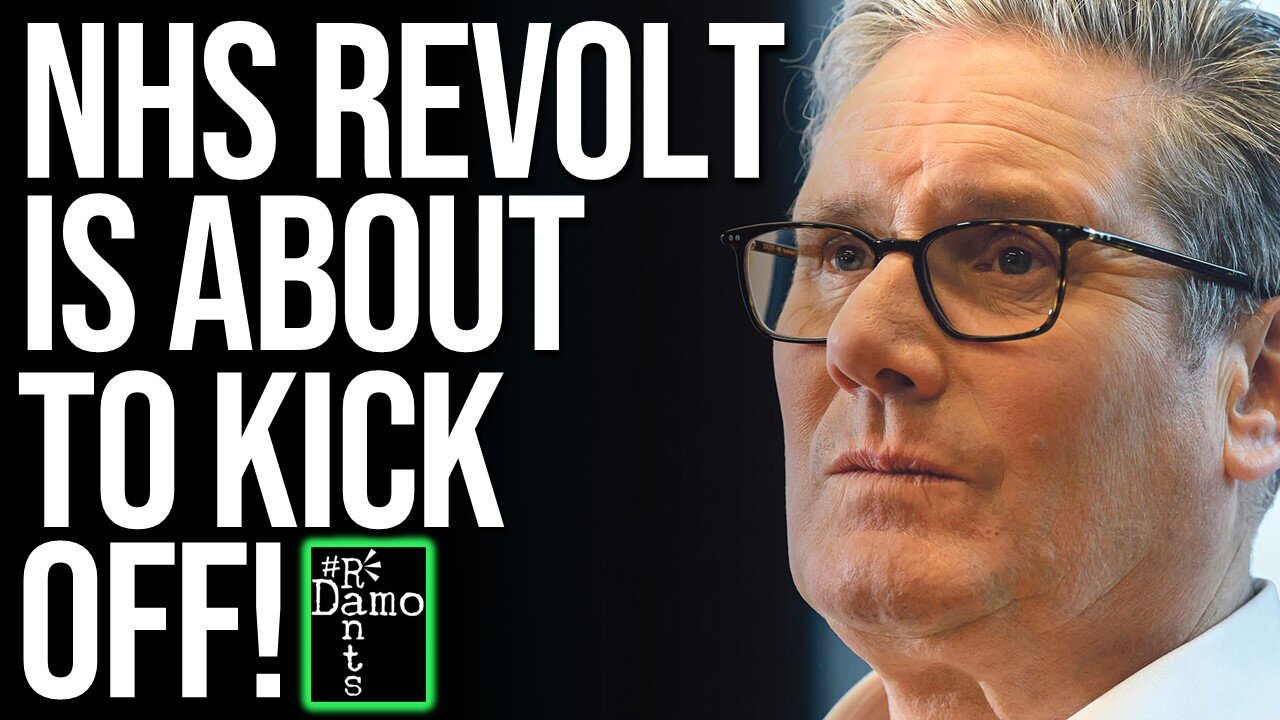Premium Only Content

Starmer’s NHS Plan Just Backfired—In His Own Constituency
Right, so on the streets of Holborn and St Pancras, something unprecedented is unfolding. Constituents of Keir Starmer, are organising against him you see. Their cause? Saving the NHS from the very party that created it, not that it resembles that party very much any more of course. Tomorrow, June 15th as that will be at time of writing, a grassroots group called Holborn & St Pancras 4 the NHS is launching a campaign against Labour’s 10-year health plan, calling it a blueprint for privatisation and corporate capture. That this rebellion is happening in Starmer's own seat couldn’t be more perfect, it is not a mere local skirmish, not when its happening on the PM’s own patch—it is a warning flare signalling national discontent.
The Labour Party, which birthed the NHS in 1948 as a beacon of post-war social solidarity, now stands accused of facilitating its commodification. Of privatising it as fast as their weaselly bought and paid for guts can possibly allow them. Under Keir Starmer and Health Secretary Wes Streeting, Labour's health agenda has shifted very much for the worse. Their proposals promise modernisation, efficiency, and digital transformation. But call this hides a dangerous drift towards privatisation-by-stealth, donor influence, and technocratic governance that alienates patients and professionals alike. So in light of that, and if you’re as worried about the NHS as those in Starmer’s backyard are, well, they’d quite like you to join them tomorrow if you can.
Right so earlier this month, Labour released its highly anticipated 10-year plan for the NHS. Framed around three major shifts—"from hospital to community," "from analogue to digital," and "from sickness to prevention"—the document was described by Streeting as an "ambitious reimagining" of health delivery. But lets be honest, this plan is thin on substance and thick on euphemism.
The first shift proposes that hospitals no longer be the default for treatment. Instead, neighbourhood health centres and Integrated Health Organisations (IHOs) would absorb outpatient and even some inpatient care. While presented as decentralisation, this actually consolidates power into large regional entities—often Foundation Trusts—that can oversee GP, community, and hospital care budgets. These resemble US-style Accountable Care Organisations, known for cost-cutting and risk selection rather than patient care and that’s no accident when there is already so much US private health involvement in our NHS these days. The potential consequences of this shift include reduced access to specialist services, closure of local hospital departments, and financial incentives that may prioritise budget savings over clinical outcomes.
The second shift prioritises digital transformation. The NHS App is set to become a "doctor in your pocket," offering AI-driven triage, access to records, and remote consultations. On paper, this sounds efficient especially when we’re all struggling to get hold of our GPs or being seen this side of next month, but this is the further erosion of that capability. In practice, it invites concerns about patient exclusion, computer misdiagnosis, and the replacement of trained clinicians with an algorithm. Vulnerable groups—such as the elderly, the digitally excluded, and those with complex conditions—risk being left behind in a system that will be markedly unfriendly to them.
The third shift focuses on prevention: reducing obesity, promoting mental health, and improving lifestyle choices. While prevention is a perfectly reasonable and laudable goal, the plan fails to adequately address the root causes of ill health—poverty, poor housing, environmental degradation, and precarious work conditions. Without structural interventions, preventive health becomes little more than individualised responsibility and lifestyle surveillance. Why aren’t you helping yourself more, whilst undermining ordinary people’s ability to do so.
Moreover, Labour’s plan has been widely criticised for its lack of consultation with frontline professionals and patient advocacy groups, par for the course of the Starmer regime though, who know etter than everyone. Major unions and the British Medical Association were not closely involved in drafting the proposals, raising concerns about transparency and democratic legitimacy.
Therefore, the formation of Holborn & St Pancras 4 the NHS (HSP4NHS) marks a profound rupture between Labour leadership and its base, literally a campaign to push back at NHS privatisation and raise awareness of what is being done amongst Starmer’s own constituents. That is pretty brutal on the optics isn’t it? According to a report by Skwawkbox, activists from across Camden have come together to oppose what they see as a privatisation agenda masquerading as reform. Their campaign will include door-to-door canvassing, public meetings, and information stalls—all aiming to alert constituents to the real risks behind the 10-year plan.
Supporters include Dr Bob Gill, a long-time critic of NHS marketisation, and former ANC MP Andrew Feinstein, who of course challenged Starmer for his seat at last years General Election and despite Labour’s landslide victory, Starmer’s own majority was cut in two. Their message is blunt: Labour can no longer be trusted with the health service. When your own constituents begin organising against one of your signature policies, the party and government that you lead and their plans, the political centre of gravity has shifted somewhat.
Privatisation of the NHS is not hypothetical; it is a lived reality. According to the BMA's September 2024 report on outsourcing, nearly £13 billion of the NHS England budget is now spent annually on private providers. This includes elective surgeries, diagnostics, mental health care, and even some A&E services. The total amount of contracts awarded to private companies has steadily risen since the Health and Social Care Act 2012 opened the floodgates to market competition within the NHS.
Operose Health, the UK subsidiary of US insurance giant Centene, now runs more than 50 NHS GP surgeries, serving over half a million patients. Even some in the mainstream media have switched onto this. The Guardian revealed how Operose uses physician associates in place of fully qualified doctors, raising serious safety concerns. Unqualified doctors passing themselves off as doctors and you won’t know the difference. They flagged that happening three years ago, its just continuity Tory policy under Starmer’s regime therefore, so much for that promised change. Leaked documents suggest that these associates are often overworked and under-supervised, they are supposed to be observed by an actual doctor but in practice it rarely happens, leading to potential risks for patients. Despite legal challenges and public protests, contracts have continued to flow.
Private firms like InHealth, and Randox control vast swathes of diagnostics, community health, and even COVID testing. According to Byline Times and the Economics Observatory, the outsourcing of services is linked to falling care quality and rising mortality rates. Reports have found that private providers often “cherry-pick” low-risk, high-profit patients while leaving more complex and expensive cases to under-resourced public hospitals. Yet Labour’s plan fails to reverse this trend; instead, it formalises it by expanding opportunities for private sector delivery within Integrated Care Systems.
The presence of private equity in the NHS has grown steadily, with companies increasingly treating GP surgeries, diagnostic hubs, and urgent care centres as financial assets to be traded. Once these assets are embedded into NHS commissioning structures, reversing them becomes politically and legally difficult—cementing privatisation for generations.
The most damning evidence of Labour's shift though has got to be its funding. Wes Streeting has received over £175,000 in donations from individuals linked to private health firms, including Tory donor David Meller—a key figure behind PPE outsourcing scandals. Keir Starmer's leadership has attracted hundreds of thousands from corporate interests, many with ties to healthcare lobbying.
Reports from The Canary, Skwawkbox, and OpenDemocracy show how Labour’s front bench has accepted over £650,000 from private health-connected donors, more than the Conservative Party over the same period. These financial links raise serious questions: how can Labour legislate against privatisation when it is bankrolled by those who profit from it?
Donations from hedge fund managers with stakes in companies like UnitedHealth, and consultancies such as McKinsey that have advised on NHS reforms, cast a shadow over policy-making. The pattern mirrors a broader trend in Westminster: policies that align uncannily with the interests of those writing the cheques.
Labour has failed to institute safeguards that would prevent such conflicts of interest. There is no binding party rule requiring the declaration or recusal of shadow ministers from policymaking where donor interests are at stake. As such, the line between lobbying and legislating continues to blur.
The promise of a digital NHS is seductive. But digital triage tools, AI diagnostics, and remote consultations threaten to create a two-tier system: those who can navigate apps and those who cannot. Elderly, disabled, and digitally excluded patients are at risk of falling through the cracks.
Rather than increasing access, this approach can reduce clinical contact, normalise self-diagnosis, and pave the way for private tech firms to insert themselves into NHS workflows. Companies like Babylon Health are already trialling AI-led services under NHS branding. Once embedded, their profit motive becomes difficult to dislodge.
The use of large-scale patient data by private contractors raises further ethical concerns. Palantir, a controversial US firm with ties to military surveillance, not least in Israel, now runs major NHS data systems under contract. Without strict data protection and public oversight, this infrastructure risks being leveraged for commercial exploitation or even international outsourcing.
Labour’s failure to draw clear red lines around the role of big tech in public health leaves the NHS vulnerable to corporate capture. Instead of investing in publicly owned, open-source digital tools, the party appears willing to hand over core infrastructure to Silicon Valley giants. This is austerity masked as innovation.
This crisis is not just about policy—it is about identity. Labour once stood for universalism, public ownership, and solidarity. Today it speaks the language of markets, apps, and optimisation. The transformation is ideological. No longer are they Labour, they are Tory. The NHS is no longer a moral commitment but a management problem to be solved by private health consultants and algorithms.
What could have been done instead? Labour could have taken the courageous step of repealing the Health and Care Act 2022, a piece of legislation that deepened the marketisation of the NHS by embedding Integrated Care Systems that blur the boundaries between public and private provision. Scrapping this act would have been the first step toward restoring public accountability and democratic control over health services.
Rather than continuing to outsource essential services to profit-seeking firms, Labour could have committed to ending all outsourcing and rebuilding NHS capacity in-house. This would involve investing in publicly owned diagnostic centres, community services, and hospital infrastructure—ensuring the NHS is able to meet demand without reliance on external contractors.
Labour could have also pledged a funding settlement that reflects the actual needs of a 21st-century health service, including long-term capital investment in hospital estates and fair wage agreements for frontline staff. Instead of treating health budgets as a fiscal burden, the party could have reframed them as an investment in national well-being which is what the NHS is supposed to be.
Another vital reform would have been the full integration of social care into the NHS under public control. This would end the fragmented, means-tested system that leaves millions without support and would bring dignity and continuity to those in need of long-term care.
Finally, Labour could have reinvigorated the democratic ethos of the NHS by introducing elected community boards to oversee local health services. These boards, could be composed of patients, clinicians, and local residents, would ensure transparency and accountability—putting power back in the hands of those who use and deliver the actual care.
Instead, Labour chose managed decline. In doing so, it has not only betrayed the legacy of Aneurin Bevan, but made itself indistinguishable from the Conservatives on health.
The NHS is not just another policy area. It is the embodiment of a social contract: care according to need, not wealth. It is the longstanding proof that socialism works. But by aligning itself with private interests, adopting managerial language, and dismissing grassroots and professional concerns, Labour under Starmer has torn up that contract.
But the action in Camden shows the public will not go quietly and if you can get to Camden tomorrow, they’d quite like you to be a part of this too, so they’ve put out a statement inviting you to be a part of giving Starmer what for in his own patch:
‘Angry with the state of the NHS? So are we.
We’re not waiting for politicians to fix it — we’re hitting the streets of Camden, and people are literally running after us to sign our open letter to Keir Starmer.
HSP4NHS is all about cutting through the spin, knocking on doors, and having real conversations. It’s bold, it’s direct — and it’s working.
Come have a go at canvassing (or just shadow if you’re curious). No scripts, no BS — just people power.
The residents are getting engaged!
People are becoming energised!
Meet up at Old Diorama arts centre
Regents Place
201 Drummond St
NW1 3FE
5.30pm on Tuesday 15th
Short chat with us then off to shadow experienced canvassers or go it alone!
Canvassing starts at 6.30
Stop at 8pm and head back to the Old Diorama arts centre where we will have a room, food and drink
If you want to volunteer in general: [email protected]’
Be a part of something special and send Starmer a message he’ll feel a bit more than a ragey social media post!
As patients, staff, and citizens begin to resist, Labour faces a choice: restore trust through radical reinvestment and renationalisation, or face political ruin, because more and more people are onto them.
Speaking of people being onto Starmer, the same might be being said in regards to the conflation between antisemitism and anti-Zionism as British anti-Zionist Jews, the inconvenient truth facing the pro Israel Starmer regime, being that not all Jews support Israel of course, large numbers do not, has elicited some rather unsavoury action against certain high profile individuals outraged at their faith being weaponised to defend the indefensible, well its backfiring royally on Labour as it damn well should do. Get all the details of that story in this video recommendation here as your suggested next watch.
Please do also hit like, share and subscribe if you haven’t done so already so as to ensure you don’t miss out on all new daily content as well as spreading the word and helping to support the channel at the same time which is very much appreciated, holding power to account for ordinary working class people and I will hopefully catch you on the next vid. Cheers folks.
-
 2:56:44
2:56:44
TimcastIRL
4 hours agoNBA Games RIGGED, 34 Indictments, Democrat Calls It TRUMP'S REVENGE | Timcast IRL
204K91 -
 2:54:13
2:54:13
Laura Loomer
3 hours agoEP152: Texas Man Arrested For Threatening To Kill Laura Loomer
19K22 -
 1:34:02
1:34:02
Man in America
7 hours agoEXPOSED: What the Vatican, CIA, & Elites Are HIDING About True Human Potential
18.9K12 -
 3:18:12
3:18:12
Barry Cunningham
4 hours agoJOIN US FOR MOVIE NIGHT! TONIGHT WE FEATURE THE MOVIE RFK LEGACY!
39.7K17 -
 1:13:42
1:13:42
Sarah Westall
5 hours agoHow Bitcoin was Hijacked, Palantir is a Deep State Upgrade & more w/ Aaron Day
19.1K4 -
 15:59
15:59
ArynneWexler
7 hours agoAll The Reasons You're Right to Fear Zohran Mamdani | NN6
9.54K1 -
 LIVE
LIVE
Side Scrollers Podcast
11 hours ago🔴FIRST EVER RUMBLE SUB-A-THON🔴DAY 4🔴BLABS VS STREET FIGHTER!
1,017 watching -
 LIVE
LIVE
DLDAfterDark
3 hours agoGlock's Decision - How Could It Impact The Industry?
298 watching -
 25:57
25:57
The Kevin Trudeau Show Limitless
1 day agoThe Sound Of Control: This Is How They Program You
38.6K8 -
 8:29
8:29
Colion Noir
14 hours agoThree Masked Idiots Show Up at Her Door — Here’s What Happened Next
46K27